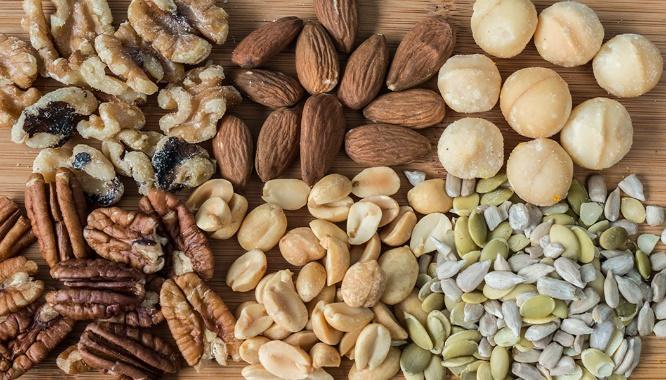Nuts offer numerous benefits due to their nutritional composition. While the macronutrient profiles (protein, carbohydrate, and fat) of various nuts are similar, their micronutrient (vitamin and mineral) content may vary slightly.
Here are the key advantages of incorporating nuts into your diet:
Abundance of “good fats”:
Most nut types contain monounsaturated fats, which are considered healthy for the body. Additionally, walnuts are rich in polyunsaturated fats, which offer further benefits.
Low in saturated fats:
Nuts are generally low in saturated fats, which are known to contribute to cardiovascular issues when consumed in excess.
Excellent source of dietary protein:
Nuts serve as a valuable plant-based protein alternative to animal protein sources. They can contribute to meeting your protein needs.
Rich in arginine:
Certain nuts, such as almonds, are high in the amino acid arginine. This amino acid promotes healthy blood vessels and overall cardiovascular well-being.
Cholesterol-free:
Nuts are free of dietary cholesterol, making them a heart-healthy choice.
High in dietary fiber:
Nuts contain a significant amount of dietary fiber, which aids in digestion and helps maintain a healthy digestive system.
Antioxidant-rich:
Nuts are packed with phytochemicals that act as antioxidants. These compounds protect cells from damage caused by harmful free radicals.
Abundant in vitamins and minerals:
Nuts offer a wide array of essential vitamins and minerals. Vitamins found in nuts include E, B6, niacin, and folate, while minerals include magnesium, zinc, plant iron, calcium, copper, selenium, phosphorus, and potassium.
Incorporating a variety of nuts into your diet can provide you with these beneficial nutrients and contribute to your overall well-being.
Seeds offer a wide range of health benefits, much like nuts. They are rich in essential nutrients and can positively impact various aspects of our well-being.
Here are the key advantages of incorporating seeds into your diet:
Protein, healthy fats, and fiber:
Similar to nuts, seeds are excellent sources of protein, healthy fats (with a higher proportion of polyunsaturated fats), and dietary fiber. These nutrients promote satiety, aid in maintaining energy levels, and support a healthy digestive system.
Abundance of minerals:
Seeds are packed with important minerals such as magnesium, potassium, calcium, plant iron, and zinc. These minerals play crucial roles in various bodily functions, including muscle function, bone health, and immune system support.
Essential vitamins:
Seeds are rich in vitamins B1, B2, B3, and vitamin E. These vitamins are involved in energy production, cell function, and act as antioxidants, protecting the body against oxidative stress.
Antioxidant content:
Oily seeds, such as flaxseeds and chia seeds, contain antioxidants that help prevent the fats from becoming rancid. These antioxidants also offer numerous health benefits to the human body, including reducing inflammation and protecting against chronic diseases.
Weight management:
The nutrient density of seeds, combined with their high fiber content, can aid in weight management by promoting feelings of fullness and reducing overeating.
Reduced heart disease risk:
The healthy fats present in seeds, particularly polyunsaturated fats, can help lower cholesterol levels, reduce inflammation, and improve heart health, thereby lowering the risk of heart disease.
Reduced diabetes risk:
Incorporating seeds into a balanced diet may help reduce the risk of developing diabetes. The combination of protein, fiber, and healthy fats in seeds contributes to stable blood sugar levels and improved insulin sensitivity.
By incorporating a variety of seeds into your diet, you can harness these health benefits and contribute to your overall well-being, weight management, and disease prevention.
How to include nuts and seeds in your diet?
Add them to your breakfast:
Sprinkle a handful of chopped nuts or seeds over your cereal, oatmeal, or yogurt. You can also mix them into pancake or muffin batter for added texture and nutrition.
Use them as a topping:
Sprinkle nuts or seeds on top of salads, soups, or roasted vegetables to add crunch and flavor. They can also be used as a garnish for stir-fries or grain bowls.
Make homemade trail mix:
Create your own trail mix by combining different nuts, seeds, and dried fruits. This can be a convenient and nutritious snack option for when you’re on the go.
Incorporate them into baked goods:
Add chopped nuts or seeds to your homemade bread, cookies, or granola bars for added nutrients and a satisfying crunch.
Make nut or seed butter:
Blend nuts or seeds in a food processor until they turn into a creamy butter consistency. Enjoy them spread on toast, as a dip for fruits or vegetables, or as an ingredient in sauces and dressings.
Include them in smoothies:
Add a tablespoon of nut or seed butter, or a small handful of nuts or seeds, to your smoothies for extra protein, healthy fats, and a creamy texture.
Make energy balls or bars:
Combine nuts, seeds, dried fruits, and a binder like honey or dates to create homemade energy balls or bars. These can be a nutritious and portable snack.
Sprinkle them on roasted vegetables:
Roasted vegetables can benefit from a sprinkle of chopped nuts or seeds before serving. It adds a delightful crunch and extra flavor.
Use them as a crust or coating:
Crushed nuts or seeds can be used as a coating for baked chicken or fish, or as a base for a crust in dishes like cheesecake or quiches.
Remember to be mindful of portion sizes, as nuts and seeds are calorie-dense. Aim for a handful (about 1 ounce or 28 grams) per day as a general guideline. Additionally, if you have any specific dietary restrictions or allergies, make sure to choose nuts and seeds that are safe for you to consume.

